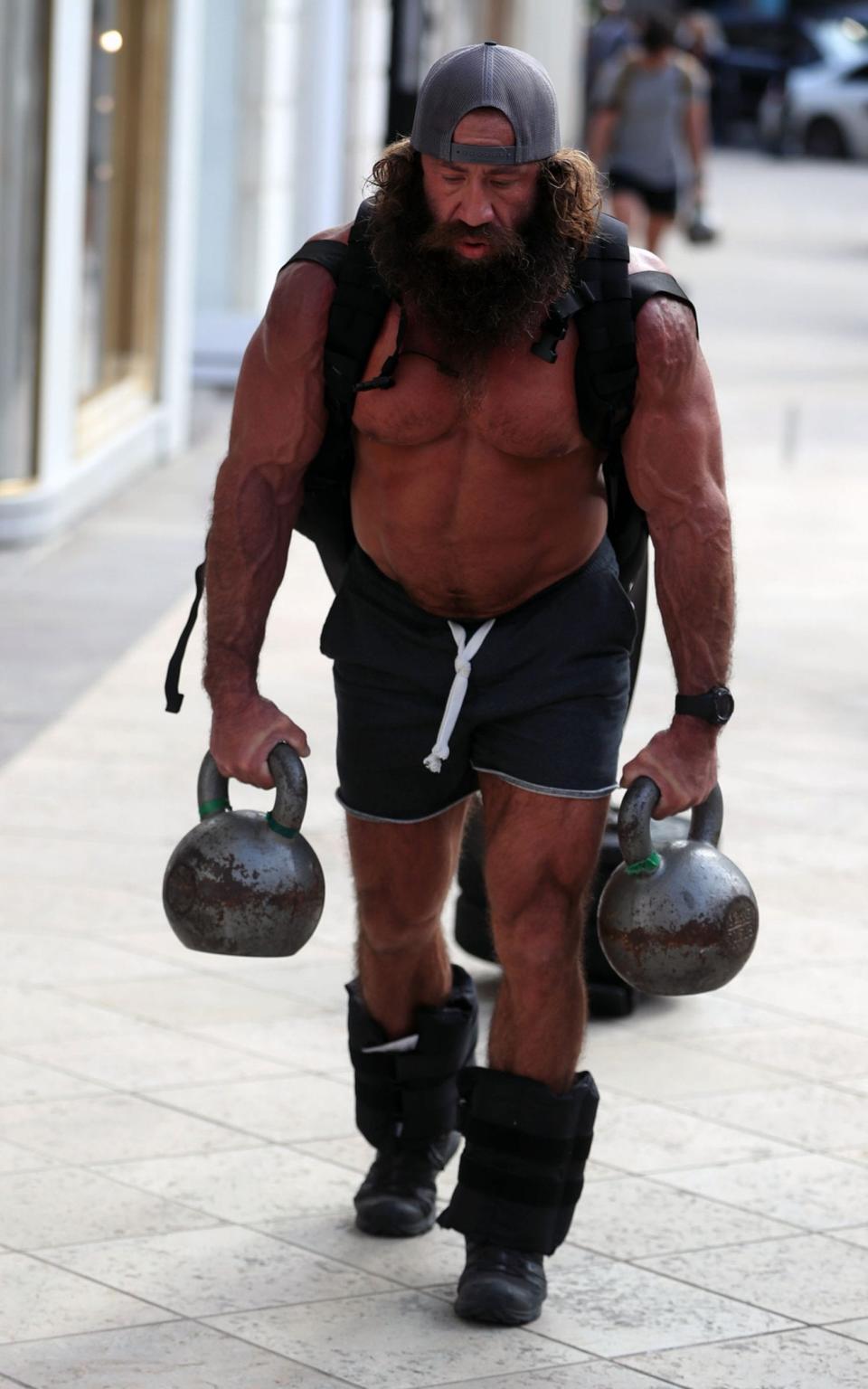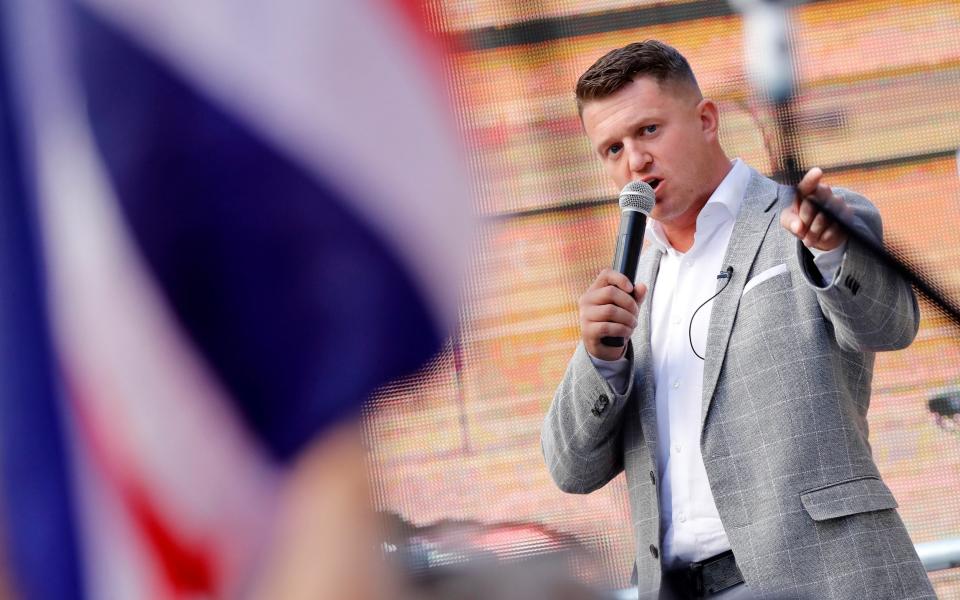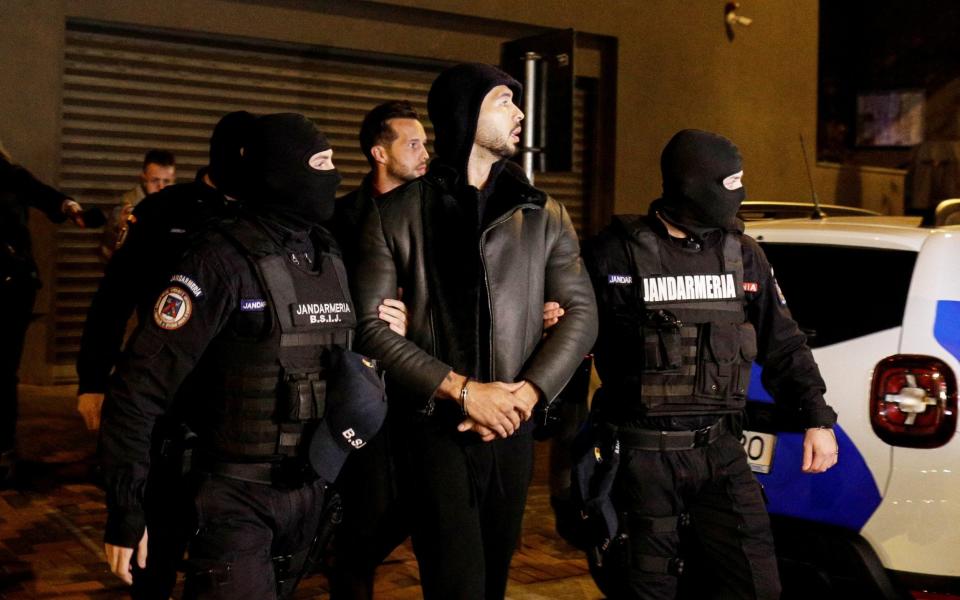The toxic ‘alpha males’ turning Britain’s teenage boys against women

Annabella* first noticed something was wrong with her teenage son Jacob* when they were chatting over dinner one evening late last year.
‘We’re quite philosophical in our discussions,’ says the 57-year-old, who lives with her son in Oxfordshire. ‘[But] he started to come out with shocking things.’
Jacob suddenly declared that a man’s role is to go to work and to provide stability, and a woman’s role is to stay at home. ‘If a woman wants to go clubbing, she shouldn’t be allowed to, because they belong at home,’ he told her.
Annabella was shocked. Jacob was 17 at the time; ‘a really nice, decent kid’. She had never heard these views from him.
But Jacob wasn’t finished. He was adamant that buildings are all grey because architects want men working in them to be depressed; that feminists are ruling the world, and trying to demean and diminish men so they can take over.
‘It was shocking, because Jacob’s not like that,’ Annabella says today. ‘I thought: “My God, he’s been indoctrinated. He’s changing his values.”’
Jacob explained that he had been watching videos posted on YouTube and TikTok by an influencer called Andrew Tate. He was paying £40 a month to Tate to receive exclusive content from his ‘Hustlers University’. Tate was, Jacob declared, his new idol.
Confused, Annabella googled him and what she saw deeply concerned her. In the past Tate, a self-declared misogynist, has described how, if a woman accused him of cheating, he would ‘bang out the machete, boom in her face and grip her by the neck’; claimed that in marriage women ‘belong to the man’; and tweeted that ‘if you put yourself in a position to be raped, you must bare [sic] some responsibility’.
For the next two hours, Annabella attempted to counter Jacob’s points. ‘I never argue with Jacob,’ she says. ‘We always talk things through. But I just couldn’t carry on the conversation.’
She believes that her son was susceptible to Tate’s teachings because he is ‘vulnerable’ – he had battled with anxiety as a teenager and rarely left the house in recent years.
Tate, 36, has claimed to be the world’s ‘first trillionaire’. He gained notoriety through social media posts about his lavish ‘alpha male’ lifestyle and promoting what he calls ‘traditional’ male values, including having simultaneous relationships with several women, fathering multiple children, and owning women as if they are property. ‘Why would you be with a woman who’s not a virgin anyway?’ Tate said in a 2014 kickboxing magazine interview, adding that women who aren’t virgins are ‘used goods’. In his YouTube videos, Tate has called cheating ‘exercise’, said he is ‘absolutely a misogynist’, and regularly referred to women as ‘bitches’. He has also said that if he were to have a son who is a ‘nerd’, ‘one of us has to die, him or me, and I’ll challenge him to mortal combat’.
Last year he was banned from Instagram, Facebook and TikTok, with TikTok saying he broke the platform’s rules by sharing ‘content that attacks, threatens, incites violence against, or otherwise dehumanises an individual or a group’ – but not before videos featuring Tate had accrued more than 11 billion views. His Twitter ban, enforced in 2017, was reversed in November 2022 after Elon Musk took charge of the site; on 28 December he engaged in a viral spat with climate activist Greta Thunberg, tweeting herto brag about his 33 cars and their ‘enormous emissions’. (She duly responded that he should email her further details at ‘smalld—kenergy@getalife.com’.)
yes, please do enlighten me. email me at smalldickenergy@getalife.com https://t.co/V8geeVvEvg
— Greta Thunberg (@GretaThunberg) December 28, 2022
Then, on 29 December, Tate was arrested in Romania on human trafficking, rape, and organised crime charges – all of which he denies. He remains in custody, having had his appeal against detention rejected by Romanian courts. There is little clarity about what evidence investigators have gathered so far, according to the BBC.
But that hasn’t stemmed the so-called ‘alpha male’ movement online. ‘You get a whole host of copycats attempting to fill the gaps once [prominent figures] are deplatformed,’ says Joe Mulhall, director of research at British campaign group Hope Not Hate.
Tate is just one of many high-profile influencers, forums and websites operating in the so-called ‘manosphere’, a network of online men’s communities promoting masculinity and, in many cases, misogyny.
Other ‘alpha male’ influencers have included Daryush Valizadeh, a 43-year-old ‘pick-up artist’ known as Roosh V, who rose to prominence by sharing techniques to emotionally manipulate women into bed on his blog. ‘The demographic crisis the West faces today is primarily due to allowing women to do as they please,’ he wrote on the Return of Kings website, which he created. ‘The direct cause of this horror movie is giving women the vote.’ He has since taken down his website and says that he has 'repented'.
American podcast duo Fresh & Fit host weekly ‘Womanizer Wednesday’ discussions on their YouTube channel where recent video topics include, ‘Why being faithful is the woman’s job,’ and, ‘Top 8 signs she’s a bimbo!’ Another influencer, Russell Hartley, who calls himself an alpha-male dating coach, describes some women as ‘high value’ and says men should keep a ‘stable’ of women on the hook emotionally, romantically and sexually; he has almost 700,000 TikTok followers.
Not all alpha-male influencers rely on misogynistic rhetoric in their pursuit of hypermasculinity. Some simply advocate a return to an ‘ancestral’ or ‘traditional’ lifestyle, like the Liver King (real name Brian Johnson), an American influencer who addresses his 1.7 million followers as ‘primals’ and eats mostly meat and raw organs. He once said he is not worried about toxic masculinity, adding: ‘You know what I’m concerned about? I’m concerned that we have a soft man problem today.’

But then there is Men Going Their Own Way, or MGTOW, an online anti-feminist movement made up of men who aim to live their lives without women in order to, as one MGTOW ‘manifesto’ puts it, ‘instil masculinity in men’. The movement has its own online forum, on which tens of thousands of active members share posts about an ‘epidemic of feminised men’.
Women-hating men grousing about their lot in life is nothing new, but their appeal is growing. Self-styled alpha men espouse similar values to those proselytised by the incel movement, an online community of men who call themselves ‘involuntary celibates’ as they are unable to attract a sexual partner. For incels, who devalue women purely as sex objects, it’s women who are to blame for their lack of successful relationships – and they take a hostile attitude towards them as a result.
For nearly a decade, since 2014’s Gamergate – an online movement of angry young men ostensibly protesting ethics in video-game journalism, but in reality peddling misogyny, conspiracy theories and hate – anyone with an axe to grind has been able to find like-minded people thanks to the power of social media algorithms.
As for Tate, despite being in custody, his Twitter account still operates. Posts were appearing hourly to his 4.6 million followers when this article went to press. One read: ‘Men used to conquer foreign lands. Now we make money, train, build our bloodline, and more. Men MUST conquer something.’
Tate’s online coaching service, Hustlers University, offers ‘wealth creation courses’, with a subscription fee of $49 a month. It claims to have more than 160,000 students, who take courses including cryptocurrency and e-commerce.
Responding to his social media bans, Tate claimed he was ‘playing a comedic character’ in his videos, and in a statement to a newspaper, he wrote: ‘Internet sensationalism has purported the idea that im [sic] anti women when nothing could be further from the truth.’
But many concerned parents say otherwise. Teachers and charities have noted that a growing number of pupils – some as young as seven – idolise Tate, and that he is fuelling a culture of misogyny among schoolchildren.
Experts also claim that there has been an increase in cases of harassment against female pupils by boys in schools. ‘There’s substantial evidence that his content is being consumed by a huge amount of young men,’ says Hope Not Hate’s Joe Mulhall. ‘We’re seeing it trickling through to individuals agreeing with him, mimicking it, or repeating it.’
Determined to find a solution, several schools have designed lessons and assemblies to ‘re-educate’ pupils. The RAP Project, a programme that offers workshops in sex education, rape and consent, has received an influx of demand from schools seeking to deal with Tate’s influence since September. Its co-founder Deana Puccio says, ‘Until then I didn’t realise the scale of the influence [Tate] was having on young boys.’
The question is whether students will listen. ‘They don’t listen to their teachers when they’re 13 or 14, do they?’ says one concerned mother, Caroline*, from London. Her son Josh* is 13, and first learnt about Tate last summer; when he mentioned him to Caroline, she was clueless. ‘Come on, Mum, everybody knows who Andrew Tate is,’ Josh said. ‘He drives fast cars, he’s really into fitness, he smokes cigars, everyone thinks he’s cool.’
When Caroline probed him on Tate’s remarks about women, Josh replied: ‘He doesn’t mean it seriously… he’s just a bit of a joker.’
‘I had a long chat with Josh about what misogyny means and why people like Tate are toxic,’ Caroline says. Josh’s school also gave an assembly warning about the dangers of such rhetoric, but several of his friends still ‘worship’ Tate.
‘They’re at a co-ed grammar school, they’re bright, forward-thinking kids who, you would like to imagine, question things,’ she says. ‘The problem is they listen to their peers rather than teachers. That’s what’s so frightening.
‘You can see children being brainwashed by [Tate]... I do think it’s radicalising them.’
Born in Chicago, Tate was raised on a Luton council estate by his mother Eileen, a catering assistant. His father, chess champion Emory Tate, died in 2015. Tate first came to prominence as a teenager when he competed as a professional kickboxer, and in 2016, aged 29, he appeared as a contestant on Big Brother. His time on the reality show ended prematurely after a video surfaced of him beating a woman with a belt. (Both Tate and the woman in the video have since said the act was consensual.) But it had given him a taste for fame.
At some point, Tate crossed paths with Tommy Robinson, the far-Right activist and co-founder of the English Defence League. Tate has praised Robinson in the past, describing him on a podcast as a man with a ‘good heart’.

Dr Robert Lawson, a sociolinguistics professor at Birmingham City University, studies how men communicate online and says that Tate’s rising popularity is perhaps unsurprising. ‘He sells a seductive image of masculinity’ to young men who feel ‘pushed to the sidelines in modern society’, explains Dr Lawson. For alienated young men, figures like Tate present an attractive world view in which traditional masculinity is ‘reclaimed’.
Indeed, men under 30 are less accepting of women’s rights than those who are older, according to a recent EU-wide study by Sweden’s Gothenburg University. The study found that young men are more likely to see women’s progress as being at their expense, and that there has been a ‘backlash against gender equality in the form of rising modern sexism’. The new wave of alpha-male influencers’ success arguably capitalises on this feeling.
The problem for concerned parents is, what to do about it?
Caroline, for one, is at a loss. ‘What do we do? How do we talk to them about it?’ she says. ‘It’s totally regressive. What’s so frightening is that these are [Josh’s] formative years, and this is how he defines who he is and what his values are.’
Rachel*, 51, from Derbyshire, is similarly concerned about her 18-year-old son, Tom*, a quiet teenager who left school at 16 to do an apprenticeship and enjoys playing computer games. The family had always been close, but after Tom began idolising Andrew Tate, they had a ‘major argument’, which came to a head when Tom furiously defended Tate’s views on rape – that victims bear ‘some responsibility’ – after his arrest came up in conversation.

Rachel’s partner, Tom’s step-father, tried to explain why Tate’s rhetoric was deeply offensive but Tom was left irate. ‘It was as though someone had insulted [a family member], he was so angry. It was really out of character.’
She believes that Tom was entranced by Tate’s wealth. ‘He idolised this bloke. How they get this rose-tinted-spectacles view of someone who’s so wrong… it’s quite scary. He saw the guy as some kind of worship figure.’
Gradually, Tom appears to have ‘changed his mind’ on the matter, and on Tate.
Caroline plans to ward Josh away from the world of so-called alpha men in a similar way. ‘I hope he will keep talking to me about things,’ she says.
Though she points out that this is made harder by the fact that Josh, like many teenagers, spends a lot of time on his phone, a portal to the manosphere. ‘He’s on social media, plus his school is an hour away, so he’s on the bus with lots of older children,’ she says. ‘Even if it is farcical to us as adults, all the cars and cigars, these are people that our children are looking up to.’
For Annabella, the fallout with Jacob has been difficult, but she says things have improved since Tate’s arrest. ‘My son is grateful he didn’t go to full-disciple mode, and is feeling quite sorry for those who did.
‘I’m lucky that we have a good relationship and we talk, and he does respect my opinion,’ she says. ‘You just have to keep on trying, don’t you? I suppose that’s what being a parent is.’
Additional reporting by Claudia Rowan and Lilia Sebouai

 Yahoo News
Yahoo News 